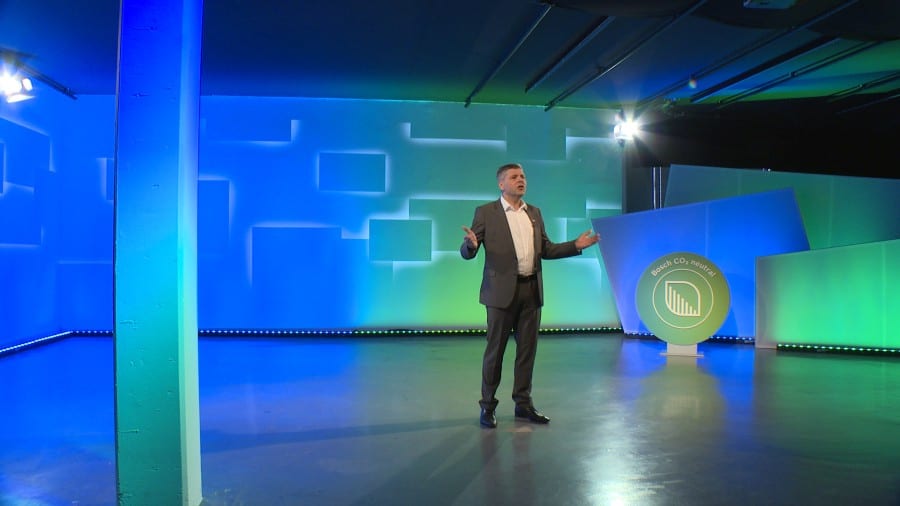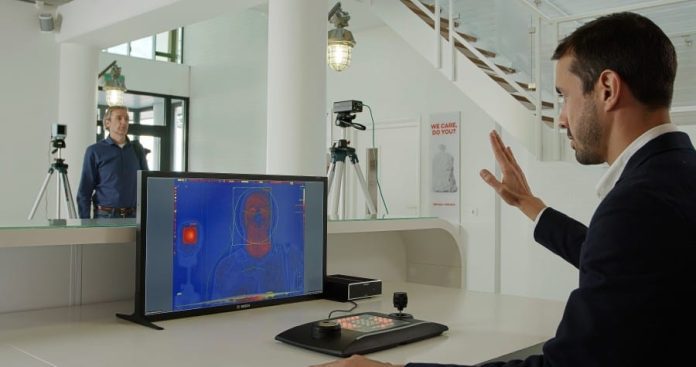German industrial giant Bosch is using CES 2021 in Las Vegas to promote its development of edge-based AI solutions, where the data processing is carried out on the device itself. It has showcased its new AI-embedded gadgetry in a range of products, including fitness trackers, air quality sensors, security cameras, Covid-19 testing kits, blood monitors, and even moon robots.
The firm has re-stated its faith in industrial AI, and its focus to be a leader in the sector. In Las Vegas – or online, at least, in light of the show’s virtual staging this time out – it has figured to conflate AI and IoT as ‘AIoT’, as the artificial intelligence of (the internet of) things.
It might be noted, as well, the firm explained-away IoT simply as ‘connectivity’. Bosch has been one of industry’s most outspoken champions of 5G, with a number of private 5G licences in the bag at home, plans to roll-out to all 250 of its factories worldwide , and a role as a chief agitator among the 5G-ACIA forum on 5G in Industry 4.0.
It took the same line on industrial AI at CES last year, after a splurge on industrial 5G at MWC and Hannover Messe in 2019, stating it will mainline data in its products and factories, to the point every product out of its 270 factories in 2025 will either contain AI or else have been developed with the help of it.
The story has not changed much. Michael Bolle, member of the board of management at Bosch, told CES 2021: “We combine AI and connectivity to form AIoT… We want to be the leading AIoT company in every area we operate in… Only companies that pursue sustainability today, and unlock the potential of AIoT, will be successful tomorrow.“

Except, of course, everything has changed since CES a year ago; and there is a corner of industry, where most of the broad IoT community reside, that says ‘digital transformation’ is the only way out of the coronavirus (Covid-19) pandemic, along with science, political leadership (presumably), and a public appetite for change.
Talk about digital change to drive sustainability, and environmental progress, has been moving away from the corporate fringes for some time, of course; the clamour for innovation in healthcare, and in healthcare-related logistics, is a symptom of global panic about Covid-19, which the tech sector wants to help with.
Very clearly, it alsoobserves a window of opportunity to offset or augment revenue streams. Bolle said this week: “[AIoT] helps us improve energy efficiency and fight Covid-19. AIoT offers enormous potential. We are already unlocking this potential and plan to expand our efforts in the future.”
So, what of Bosch’s announcements, around embedded edge-based AI? Well, lots of smart ‘stuff’; it has introduced a self-learning AI sensor for fitness trackers, doing away with the need for constant connectivity, so improving energy efficiency and data privacy; it has launched a new sensor to monitor air quality and humidity, and aerosols in the air.
This can be deployed to help with Covid-19, it said; a new security camera with integrated AI offers “highly accurate” (and anonymous) body temperature readings, plus the ability to count people and flag for crowding. Besides, Bosch has revealed a rapid Covid-19 test kit that detects positive samples in less than 30 minutes, and a portable AI-equipped haemoglobin monitor that can detect anaemia by means of a finger-scan.
Bosch said it is also involved in NASA’s Tipping Point programme, along with companies Astrobotic and WiBotic, plus the University of Washington, to develop AI-based data analysis and wireless connectivity solutions to navigate and charge small robots for operation on the moon.
Beyond this, Bosch said “comprehensive digitalization in mobility, manufacturing, and building tech” could help a country like Germany get “nearly halfway” to the Paris Agreement emissions targets; the company itself is already carbon neutral, as of 2020, it claims – “the first globally operating industrial enterprise” to achieve the feat, it said.
The company is the first automotive supplier to join the Science Based Targets initiative with a specific goal to cut upstream and downstream CO₂ emissions by 15 percent by 2030, it said. Bolle commented: “The next step for Bosch is to address emissions along the entire value chain, from procurement to product use.”
Meanwhile, Bosch also restated its line about establishing trust in AI, and specifically industrial AI – “which explains the physical world to machines, instead of teaching them how to behave like people”. AS we have reported, Bosch has drawn up an AI code of ethics that says humans should always retain control.

